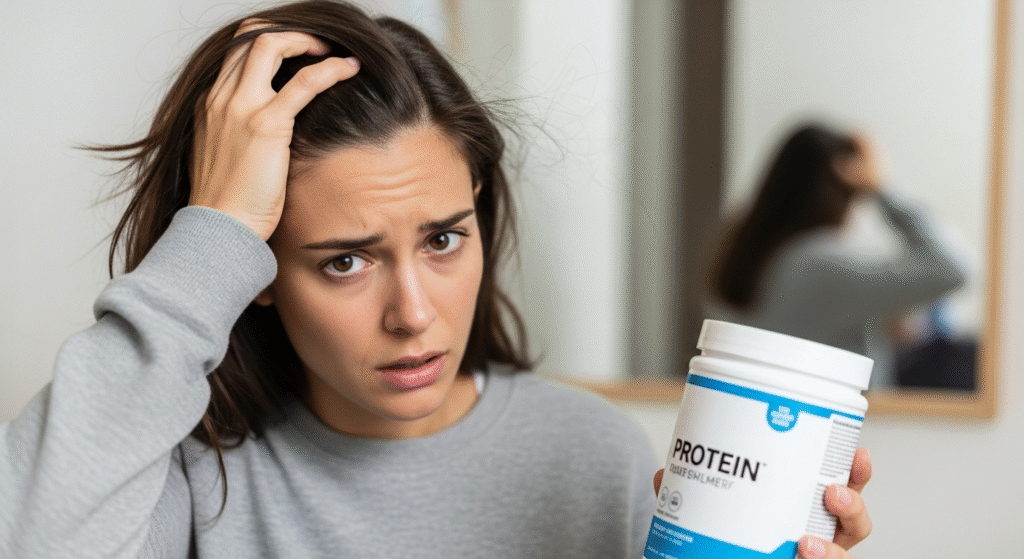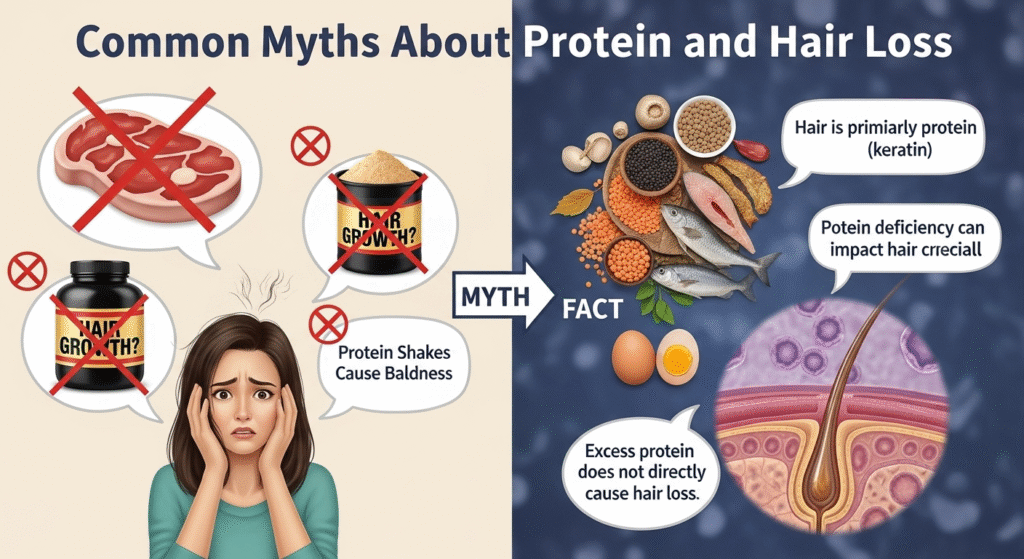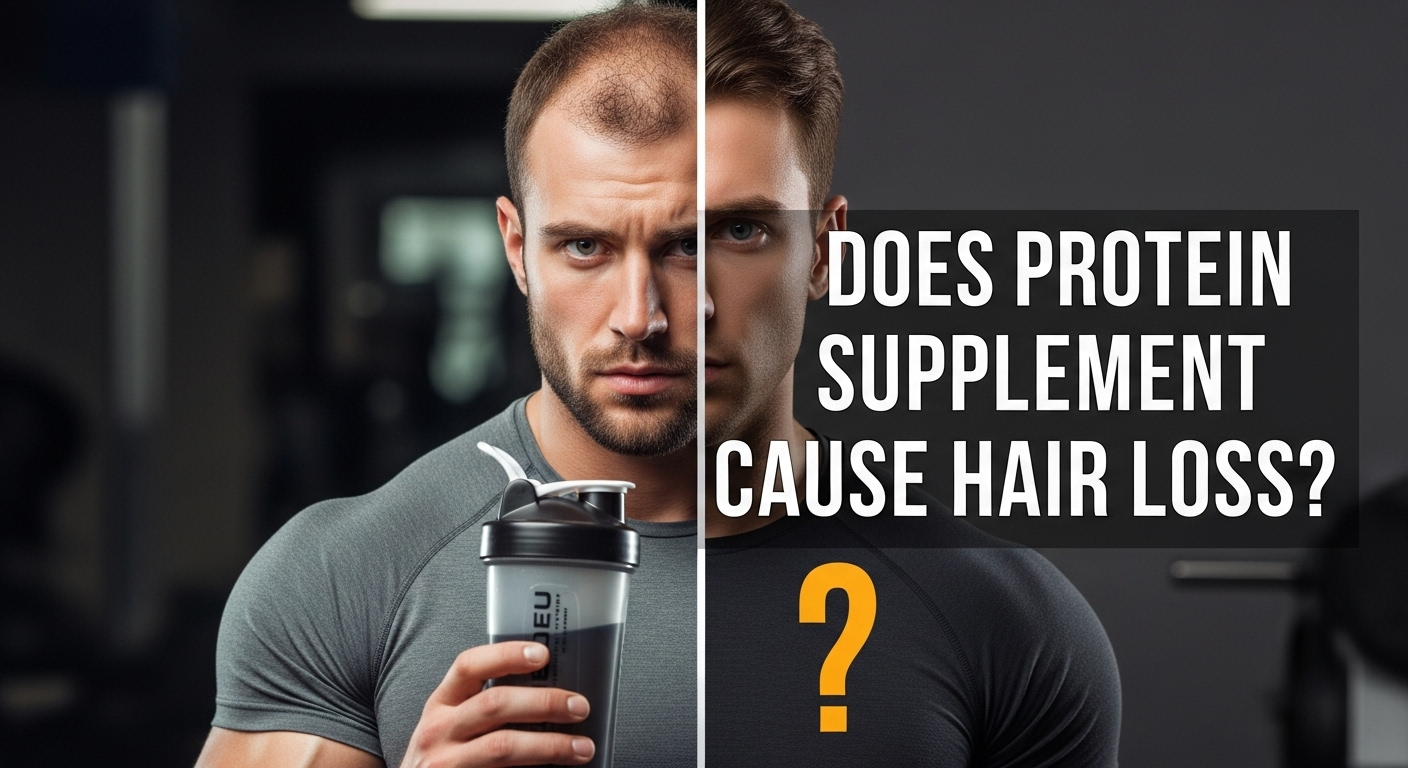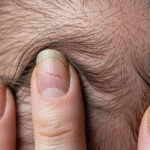If you're concerned about hair loss and wondering, "Does protein supplement cause hair loss?", you're not alone. Many people have questioned whether the protein they're consuming for muscle gain or overall health might be negatively affecting their hair. Protein is vital for hair growth, but what happens when you consume too much or the wrong …
If you’re concerned about hair loss and wondering, “Does protein supplement cause hair loss?”, you’re not alone. Many people have questioned whether the protein they’re consuming for muscle gain or overall health might be negatively affecting their hair. Protein is vital for hair growth, but what happens when you consume too much or the wrong type?
This article will dive into the relationship between protein supplements and hair health, uncover the truth, and offer expert tips for maintaining healthy hair while incorporating protein into your diet.

The Role of Protein in Hair Health
How Protein Supports Hair Growth
Protein plays a crucial role in hair health. Hair is primarily made up of keratin, a type of protein. For your hair to grow strong and healthy, you need an adequate supply of protein in your diet. Without sufficient protein, hair growth can slow down, and you may even experience hair thinning or loss.
When you consume protein, your body breaks it down into amino acids, which are then used to build the proteins needed for hair follicle regeneration. Hair follicles require a constant supply of amino acids to remain healthy and function properly. This is why maintaining a protein-rich diet is key to hair growth and strength.
How Much Protein Does Your Hair Need?
The average adult needs about 50 to 60 grams of protein per day, but hair health can be more specific. Amino acids like cysteine and methionine are particularly beneficial for hair follicles, so it’s important to focus on protein-rich foods that provide these essential amino acids. If you’re using protein supplements, it’s essential not to exceed the recommended daily intake unless advised by a healthcare provider.
Does Protein Supplement Cause Hair Loss?
The Link Between Excessive Protein and Hair Loss
While protein is vital for hair growth, excess protein can potentially have the opposite effect. Here’s how:
- Protein Toxicity: In rare cases, an overconsumption of protein supplements can lead to protein toxicity, which may interfere with your body’s ability to absorb other essential nutrients like vitamin A and biotin—both of which are crucial for hair health.
- Nutrient Imbalance: A diet that’s too focused on protein may cause an imbalance of other nutrients, such as vitamins and minerals, that play a direct role in hair growth. If your diet lacks these complementary nutrients, it may negatively affect your hair.
- Excess Nitrogen: Protein contains nitrogen, and consuming too much protein might put a strain on your kidneys and liver as they process the nitrogen waste. This strain could potentially lead to issues with hair loss over time.
Other Factors That Contribute to Hair Loss While Using Protein Supplements
It’s important to note that other factors could contribute to hair loss alongside protein supplementation:
- Stress: High levels of stress are a well-known cause of hair loss, including conditions like telogen effluvium, which often manifests as hair shedding after a stressful event.
- Genetics: Male and female pattern baldness, also known as androgenetic alopecia, is the most common cause of hair loss, and it has little to do with protein consumption.
- Hormonal Changes: Hormonal imbalances, such as thyroid issues or PCOS (Polycystic Ovary Syndrome), can also lead to hair loss, regardless of your protein intake.
Safe Protein Supplementation for Healthy Hair
How Much Protein is Safe for Hair Growth?
While protein is crucial for hair health, it’s essential to find a balance. If you’re using protein supplements, aim for about 1.2 to 1.6 grams of protein per kilogram of body weight per day, depending on your activity level and goals. Consuming more than this regularly without proper supervision could potentially lead to the aforementioned problems.
For most people, whole food sources of protein, such as lean meats, fish, eggs, and plant-based proteins (like beans and lentils), should be sufficient to meet daily needs without overdoing it on supplements.
Best Types of Protein for Hair Health
Not all proteins are equal when it comes to hair health. Below are some of the best types of protein to include in your diet:
- Whey Protein: High in essential amino acids, particularly cysteine, which is crucial for hair health.
- Pea Protein: A great plant-based option that is rich in amino acids, though it may lack some of the essential sulfur-containing amino acids.
- Hemp Protein: Contains omega-3 fatty acids and other essential nutrients that help promote hair growth.
Tips for Maintaining Healthy Hair While Taking Protein Supplements
- Balance with Other Nutrients: Ensure your diet includes vitamins and minerals such as vitamin D, iron, zinc, and biotin, all of which are necessary for optimal hair growth.
- Stay Hydrated: Adequate hydration is essential for healthy hair follicles and overall skin health.
- Consider Plant-Based Proteins: If you’re concerned about excess nitrogen or other issues with animal-based proteins, try plant-based alternatives that are easier on the body.
Common Myths About Protein and Hair Loss

Debunking Myths: Protein Supplements and Male Pattern Baldness
One common myth is that protein supplements can directly cause male pattern baldness. The truth is that genetic predisposition and hormonal factors, not protein supplementation, are the primary causes of male pattern baldness.
Protein is actually beneficial for the overall health of your hair, but testosterone levels (which are linked to baldness) play a much more significant role.
Protein Supplements Don’t Directly Cause Hair Loss in Most People
Most individuals can safely take protein supplements without experiencing hair loss. However, moderation is key. Only in rare cases, when protein intake is extremely high or unbalanced, might it lead to issues with hair shedding or thinning.
Expert Recovery Tips for Maintaining Healthy Hair While Using Protein Supplements
Managing Protein Intake to Support Hair Growth
- Focus on Whole Foods First: Aim to get the majority of your protein from whole food sources. This not only helps maintain a balanced diet but also ensures you’re getting a wider array of vitamins and nutrients.
- Monitor Supplement Dosage: If you use protein supplements, stick to the recommended serving size and consult with a nutritionist to ensure you’re not overdoing it.
Importance of a Balanced Diet
A balanced diet is essential for healthy hair growth. While protein is crucial, vitamins, minerals, and healthy fats also play a major role. Be sure to incorporate a variety of foods to promote overall health, which directly affects your hair.
FAQs
Can Protein Supplements Cause Balding?
No, protein supplements do not cause balding. Balding is primarily caused by genetic factors, and while excessive protein can cause other issues, it is unlikely to directly cause hair loss.
How Much Protein is Too Much for Hair Health?
While individual needs vary, consuming more than 2 grams of protein per kilogram of body weight regularly could be excessive for most people and may lead to nutrient imbalances, which could indirectly affect hair health.
Can Protein Supplements Help Regrow Hair?
Protein supplements cannot directly regrow hair, but they can help support overall hair health, especially if your diet is lacking in essential amino acids needed for hair growth.
Conclusion:
While protein supplements do not directly cause hair loss for the majority of people, excessive protein intake can potentially lead to hair shedding due to nutrient imbalances. To maintain healthy hair, focus on a balanced diet, monitor your protein intake, and ensure you’re getting all the vitamins and minerals necessary for hair growth.
Ready To Take Your Next Step
If you’re unsure about your protein intake and its effects on your hair health, book a consultation with Dr. Uzma Irfan, an ISHRS-certified surgeon in Islamabad today to get personalized advice tailored to your needs.






